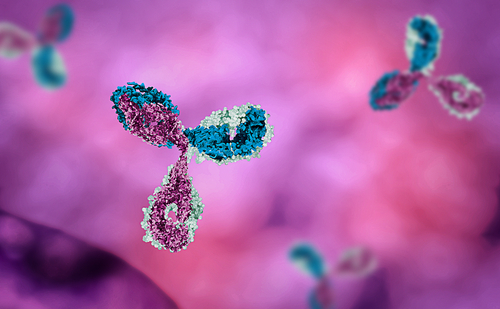Regeneron‘s bispecific antibody REGN1979 is showing outstanding clinical effectiveness in B-cell non-Hodgkin’s lymphoma patients who received prior treatments, including those who progressed after CAR T-cell therapies.
The treatment completely eliminated the cancer in 71% of follicular lymphoma and 57% of diffuse large B-cell lymphoma patients participated in a Phase 1 clinical trial, the company announced.
The findings were revealed recently at the 24th Congress of the European Hematology Association (EHA) in Amsterdam, the Netherlands, in the oral presentation, “Emerging Clinical Activity of REGN1979, an Anti-CD20 X Anti-CD3 Bispecific Antibody (AB), in Patients (PTS) with Relapsed/Refractory (R/R) B-cell Non-Hodgkin Lymphoma (B-NHL).”
REGN1979 is an antibody that specifically binds two proteins, CD20, found at the surface of cancerous B-cells, and CD3, a protein produced by immune cells. The therapy brings both types of cells together, thus improving immune responses against tumor cells, which is why it is known as “bispecific.”
The ongoing open-label Phase 1 trial (NCT02290951) is assessing the safety, tolerability, and dose-limiting toxicity of REGN1979 in people with various subtypes of B-cell non-Hodgkin’s lymphoma, who have received prior anti-CD20 treatment.
The study, which is still recruiting in the U.S. and Europe, already has treated 81 patients with increasing doses of the therapy, given weekly for the first 12 weeks, followed by every-two-weeks dosing for the next 12 weeks. Patients are being followed for an additional 15 months.
As of March 2019 (the most recent data cutoff), 13 of the 14 patients (93%) with follicular lymphoma responded to REGN1979, with 10 patients (71%) showing complete responses. These patients received doses of 5 mg or more.
Also, four of the seven (57%) patients with diffuse large B-cell lymphoma (DLBCL) — who received doses of 80 mg to 160 mg — responded to the treatment. All were complete responses and ongoing. Responses were seen both in patients whose cancer had progressed after treatment with a CAR T-cell therapy (50%), and in those who had not received such treatment (66%).
The most common treatment-emergent adverse effects were fever (83%), cytokine release syndrome — a systemic inflammatory response — (57%), chills (54%), and infections (49%).
So far, four patients stopped treatment due to side effects – including premature destruction of red blood cells, fatigue, pneumonia, and neck abscess. Also, 27 patients discontinued due to disease progression and 10 patients died.
“REGN1979 was well tolerated in [patients] with [relapsed or refractory B-cell non-Hodgkin’s lymphoma]. No [dose-limiting toxicities] and no significant neurological toxicity were observed,” the researchers wrote.
“We are very encouraged by the continued high response rates observed with REGN1979 in both relapsed or refractory diffuse large B-cell lymphoma and follicular lymphoma, cancers with typically poor outcomes,” Israel Lowy, MD, PhD, said in a press release. Lowy is senior vice president and head of Clinical and Translational Sciences, Oncology, at Regeneron,
“In this trial, two patients who failed CAR-T therapy and received REGN1979 80 mg achieved complete responses; there is currently no approved therapy for patients who progress on CAR-Ts. Our potentially registrational Phase 2 program is initiating this month and will proactively evaluate active REGN1979 doses in indolent and aggressive non-Hodgkin lymphoma,” Lowy said.
The Phase 2 trial (NCT03888105) will asses the safety and tolerability of REGN1979 in follicular lymphoma patients who failed at least two prior therapies, including an anti-CD20 antibody and an alkylating chemotherapy agent.
In 2017, REGN1979 received orphan drug designation from the U.S Food and Drug Administration. Among the benefits, Regeneron will be entitled to a seven-year period of market exclusivity for the indication, if approved.


